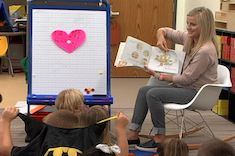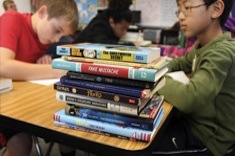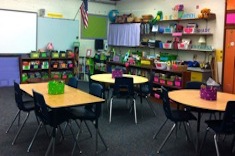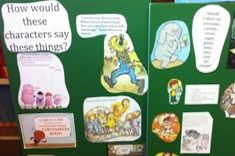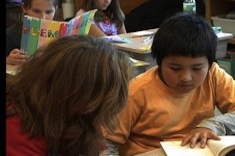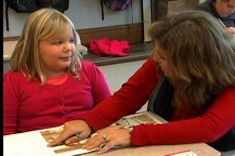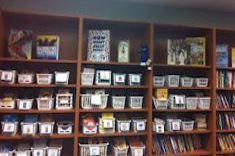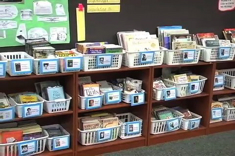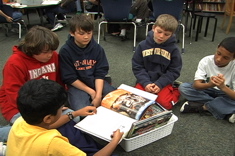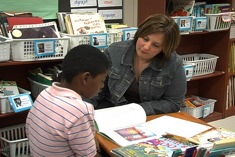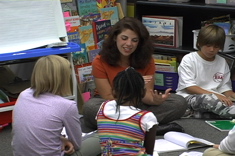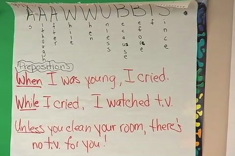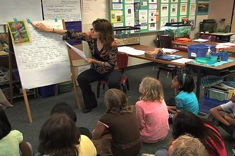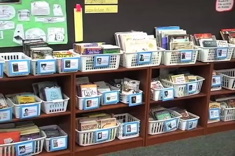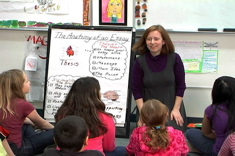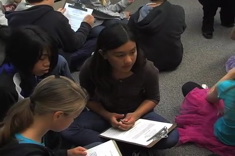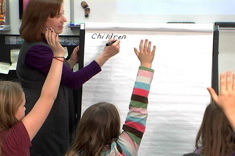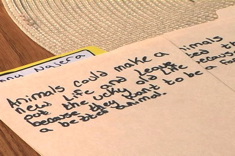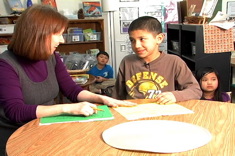4th
Latest Content
Field Experience: Social-Emotional Learning in Workshop
Compassion and understanding are as important to workshop instruction as strategies and routines. Ruth Ayres compiled a field experience to highlight the way understanding the social-emotional needs of students (and ourselves) allows for safe learning environments.
Field Experience: Craft Moves for Elementary Writers
This field experience invites us to consider a handful of craft moves to teach young writers in minilessons, conferences and share sessions.
Field Experience: Classroom Tours
Spend time noticing the details that reflect beliefs and influence instruction. Ruth Ayres set up room tours for a field experience focused on more than trendy spaces.
Field Experience: Small Group Reading Instruction
Small group reading instruction is an important part of elementary literacy. This field experience is a sampling of a variety of examples.
Field Experience: Picture Books and Older Students
The value of picture books with older students is often questioned. Ruth Ayres assembled this field experience to allow insight into the depth and power of picture books for older students.
Field Experience: General Workshop Routines
This field experience invites us to consider the routines of opening the day, workshop norms, meeting areas and transitions to make workshop run smoothly.
Walls, Displays, and Invitations Early in the School Year
Franki Sibberson turns to museums for inspiration as she designs wall displays for the start of the school year.
Conferring for Engagement: First Steps
Aimee Buckner confers with a fourth grader who is learning how to choose books for independent reading. In this video, she gives advice in the first conference and then returns 10 minutes later for a follow-up meeting.
Engaging Boy Readers: Beginning with Teacher Behaviors
Tony Keefer considers some of those awkward early conferences with male readers in his classroom, and shares advice on how to get the year off to a comfortable start with minilesson and conferring suggestions.
Never Say Never: Motivation to Read from an Unlikely Source
Knock knock. Who’s there? A boy who loves sports and has no motivation for reading. Barclay Marcell discovers an unlikely source of engaging text for a child who just doesn’t enjoy books.
Conferring About Tracking Characters
In this video from a 4th grade classroom, Aimee Buckner confers with a student who is reading The Other Side by Jacqueline Woodson.
One Book, One School: Building Community with Shared Text
"When given the choice between being right or being kind, choose kind." These words from the book Wonder set Katherine Sokolowski on the path of designing a shared reading experience at her school that will build community and empathy across the grades.
Finding a Place for Graphic Novels in My Classroom
Katherine Sokolowski listens to her husband’s sage advice and develops a new relationship with graphic novels that disappear off her classroom shelves.
The Quest for the Perfect First Read Aloud of the Year
Franki Sibberson is on a quest to find the perfect first read aloud of the year, and the search helps her consider the goals and purpose of read alouds during the first days of school.
Rethinking My Nonfiction Library in Response to the Common Core
Franki Sibberson finds a new classroom, the Common Core, and tech considerations are changing the ways she organizes the nonfiction sections of her classroom library.
Grades 3&4 Room Tour
In this video tour, Franki Sibberson narrates a description of the grades 3&4 multiage classroom she shares with a colleague. The space is small, so Franki explains how storage areas are carefully arranged and seating is creatively designed to make the most of limited space.
Matching Students to Nonfiction Texts in Grades 3-6 (BOOKLIST)
In this booklist, Mary Lee Hahn offers creative categories for considering readers in new ways.
Next-Read Stack: Conferring for Independence
Franki Sibberson explains the value of "Next-Read Stack" conferences for fostering independence, and includes a video example.
Extreme Makeover: Revision Edition
Heather Rader finds short text and shared modeling of revision strategies are just the scaffolds students need to see the power of revision for improving writing.
The Five-Minute Solution: Mini-Groups after Minilessons to Maximize Conferring Time
Aimee’ Buckner’s mini-groups are an easy and simple way to differentiate instruction in workshops, and save time when conferring.
Over the Top: Mystery Writing with Fourth Graders
Helping students navigate the boundaries between realistic fiction and fantasy can be tricky, especially when it comes to mystery writing. In this lesson from Beth Lawson’s fourth-grade classroom, Beth uses a top hat graphic to help students think through when writing is “over the top” in mysteries.
Getting Started with Sentence Observations
Karen Terlecky details the assessments and preparation that goes into the design of her sentence observation program.
Frogs as Learning Ambassadors Part 1: Literary Nonfiction in 4th Grade
Andrea Smith gets creative in teaching literary nonfiction to her 4th graders in this video series.
If You Like Junie B. Jones, You Might Like . . .
What young learner doesn’t love Junie B. Jones? Franki Sibberson shares great texts to recommend for readers who adore Junie and might be looking for similar characters and plots.
Essay Writing: Thesis Statements and Supporting Details Minilesson
Beth Lawson works with her 4th graders to develop essays with strong thesis statements and supporting details, using a folder organization system to highlight different thesis statements for each child. This is the first video in a series.
The Sponge Summary Lesson Part 5
In this sequence of videos, Heather teaches a 4th grade class, using the analogy of a sponge to explain how summaries work. In this fifth video, Heather and students shift from “I do” to “we do” as students try test their summary writing skills with partners
Essay Writing: Teacher Modeling
Beth Lawson works with her fourth graders to develop essays with strong thesis statements and supporting details, using a folder organization system to highlight different thesis statements for each child. This is the second video in a series.
The Sponge Summary Lesson Part 6
In this sequence of videos, Heather teaches a 4th grade class, using the analogy of a sponge to explain how summaries work. In this final video, Heather and students debrief and capture their learning in writing.
Conferring About Thesis Statements
In this conference with a 4th grader, Beth Lawson talks about supporting details for thesis statements. This is part of the video series from Beth’s room on essay writing.
Stuck on a Thesis: Conferring
In this conference with a 4th grader, Beth Lawson works with a student who has chosen a challenging essay topic and is struggling to develop his thesis.
Browse Content By
Type
Category
- Assessment Tools
- Big Fresh Archives
- Booklists
- Choice Numeracy
- Classroom Design
- Common Core
- Community Building
- Conferring
- Content Literacy
- Digital Literacy
- English Language Learners
- Equity
- Family Relations
- Free Samples
- Guiding Groups
- Leadership
- Literacy Coaches
- Mentor Texts
- Minilessons
- New Teacher Mentors
- Podcasts
- Poetry
- Quote Collections
- Reading Strategies
- Self Care
- Struggling and Striving Learners
- Talking and Listening
- Teacher Study Groups
- Teaching Reading
- Teaching Writing
- Word Study and Vocabulary
Author
- Melissa Quimby
- Nawal Qarooni
- Gwen Blumberg
- Julie Cox
- The Lead Learners
- Hannah Tills
- Josie Stewart
- Ruth Metcalfe
- Mallory Messenger
- Becca Burk
- Jodie Bailey
- Vivian Chen
- Mary Brower
- Tiffany Abbott Fuller
- Stephanie Affinito
- Ruth Ayres
- Leigh Anne Eck
- Heather Fisher
- Shari Frost
- Julie Johnson
- Suzy Kaback
- Gigi McAllister
- Shirl McPhillips
- Melanie Meehan
- Cathy Mere
- Debbie Miller
- Tara Barnett and Kate Mills
- Tammy Mulligan
- Dana Murphy
- Bitsy Parks
- David Pittman
- Brenda Power
- Heather Rader
- Matt Renwick
- Mandy Robek
- Christy Rush-Levine
- Gretchen Schroeder
- Jen Schwanke
- Brian Sepe
- Katherine Sokolowski
- Stella Villalba
- Jennifer Vincent
Grade Level
Choice Literacy Membership
Articles
Get full access to all Choice Literacy article content
Videos
Get full access to all Choice Literacy video content
Courses
Access Choice Literacy course curriculum and training

